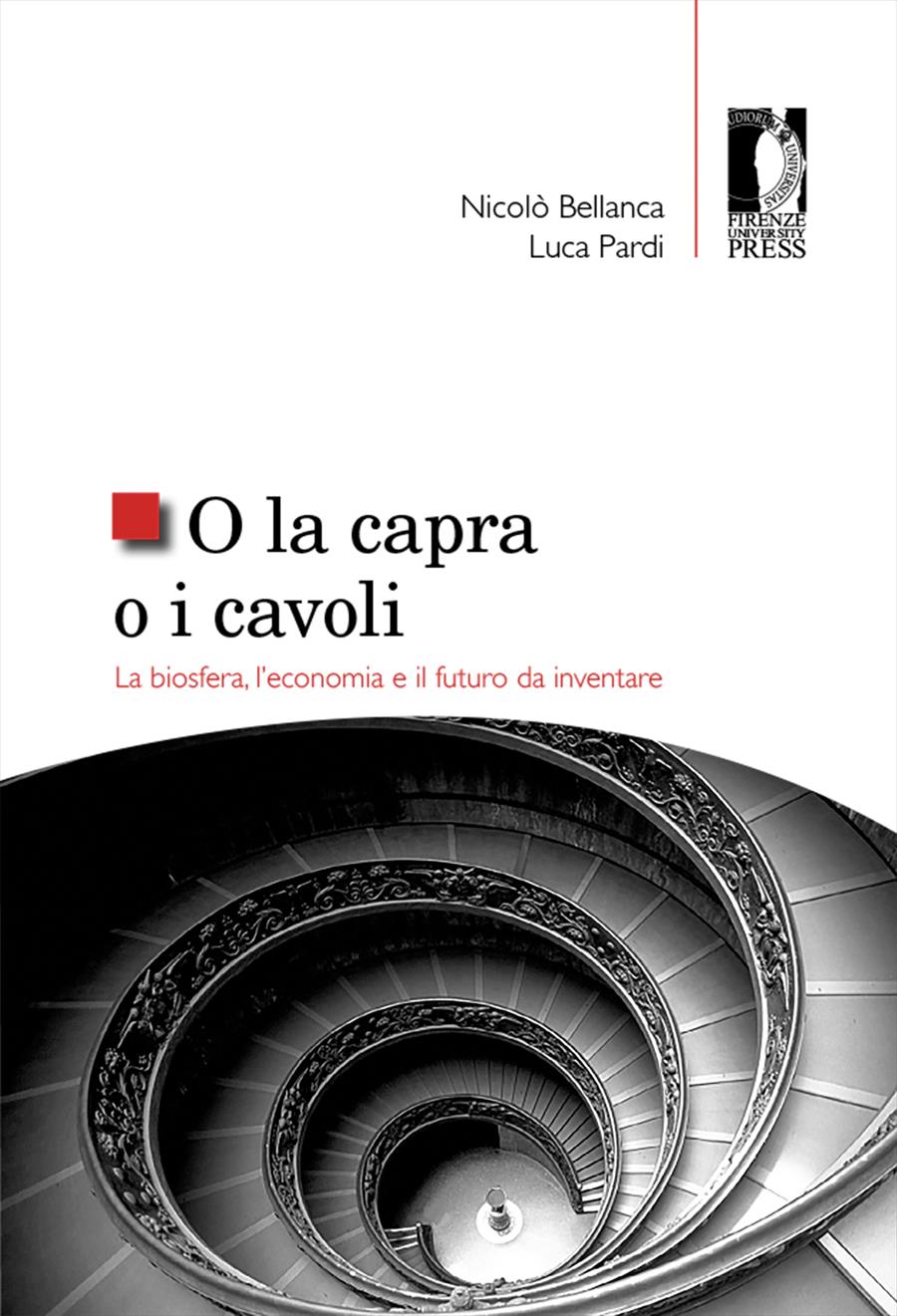- O la capra o i cavoli
- Nicolò Bellanca, Luca Pardi
Gli scenari
- Nicolò Bellanca
- Luca Pardi
- © 2020 Author(s) |
- CC BY 4.0
- DOI: 10.36253/978-88-5518-195-2.14
Chapter seven analyzes some of the most relevant future scenarios, regarding population, energy resources, public health, inequality, democracy on a national scale and forms of social power. On the population, evidences are advanced which cast doubt on the comforting idea that its trend will first become stationary and then decrease. On public health, the connotations of the Covid-19 pandemic are compared with those of the major ecological problems. On inequality, the emphasis is placed on that resulting from competition for the goods of status and power. On democracy, the tension between the national context, in which this political regime has expressed itself in our era, and global processes is discussed. Finally, the coexistence of various forms of social power and the ways in which they combine with each other is examined.
- Keywords:
- Population,
- energy resources,
- Covid-19,
- positional goods,
- social power,
- inequality,
University of Florence, Italy - ORCID: 0000-0002-3809-3455
CNR-IPCF, Institute for Chemical-Physical Processes, Italy - ORCID: 0000-0002-6870-1490
- J. C. J. M. van den Bergh e P. Rietveld, Reconsidering the Limits to World Population: Meta-analysis and Metaprediction, “BioScience”, 54(3), 2004, pp. 195-204.
- M. L. Besharov e W. K. Smith, Multiple institutional logics in organizations: explaining their varied nature and implications, “Academy of Management Review”, 2014, 39(3), pp. 364-381.
- O. Burger e J. P. DeLong, What if fertility decline is not permanent? The need for an evolutionarily informed approach to understanding low fertility, “Phil. Trans. R. Soc.”, B 371, 2016, pp. 1-8.
- D. Chakrabarty, The Climate of History: Four Theses, “Critical Inquiry”, 35(2), 2009, pp. 197-222.
- T. Crownshaw et al., Over the horizon: Exploring the conditions of a post-growth world, “The Anthropocene Review”, 6(1-2), 2019, pp. 117-141.
- J. P. De Long et al., Current Demographics Suggest Future Energy Supplies Will Be Inadequate to Slow Human Population Growth, “PLoS ONE”, 5(10), 2010, pp. 1-8.
- J. De Long e O. Burger, Socio-Economic Instability and the Scaling of Energy Use with Population Size, “PlosOne”, 10(6), 2015, pp. 1-12.
- J. Diamond e N. Wolfe, Come nascono i virus, “La Repubblica”, 21 marzo 2020.
- R. H. Frank, Positional Externalities Cause Large and Preventable Welfare Losses, “American Economic Review”, 95(2), 2005, pp. 137-141.
- D. Gilbert, It’s the end of the world as we know it (and I feel fine), TedxAcademy, 2014, <https://www.youtube.com/watch?v=&e_FkILmEQ> (09/20).
- N. J. Hagens, Economics for the future – Beyond the superorganism, “Ecological Economics”, 169, 2020.
- F. Hirsch, Social Limits to Growth, Harvard University Press, Cambridge (Mass.) 1976.
- A. O. Hirschman, Note sul consolidamento della democrazia in America Latina (1986), in Id., Come far passare le riforme, Bologna, Il Mulino 1990.
- J. M. Keynes, Prospettive economiche per i nostri nipoti (1930), in Id., La fine del laissez-faire e altri scritti, Bollati Boringhieri, Torino 1991.
- G. Lichfield, We’re not going back to normal, “MIT Technology Review”, 2020, <https://www.technologyreview.com/s/615370/coronavirus-pandemic-social-distancing-18-months/> (09/20). A. Luci-Greulich e O. Thévenon, Does economic advancement ‘cause’ a re-incr
- W. Lutz et al., Education rather than age structure brings demographic dividend, “PNAS”, 116(26), 2019, pp. 12798-12803.
- J. Maahoney e K. Thelen, A theory of gradual institutional change, in J. Maahoney e K. Thelen (a cura di), Explaining Institutional Change, Cambridge University Press, Cambridge 2010, pp. 1-37.
- M. Myrskylä et al., Advances in development reverse fertility rate, “Nature”, 460, 2009.
- T. Ord, The Precipice. Existential Risk and the Future of Humanity, Hachette, New York 2020.
- V. I. Osipov, Biosphere and Environmental Safety, Springer, New York 2019.
- U. Pagano, Is power an economic good? Notes on social scarcity and the economics of positional goods, in S. Bowles et al. (a cura di), The Politics and Economics of Power, Routledge, London 1999.
- D. Quammen, Spillover. L’evoluzione delle pandemie, Adelphi, Milano 2014.
- R. H. Robbins, Global Problems and the Culture of Capitalism, Pearson, New York 2013.
- T.H.B. Shahar, Positional Goods and the Size of Inequality, “Journal of Political Philosophy”, 26(1), 2018, pp. 103-120.
- V. Smil, Global Catastrophes and Trends, The MIT Press, Cambridge (Mass.) 2008.
- W. Streeck, How will capitalism end? Essays on a failing system, Verso, London 2016.
- W. Streeck, The return of the repressed, “New Le2 Review”, 104, 2017, pp. 5-18.
- W. Streeck, Farewell, neoliberalism: an interview, 14-12-2017, <http://kingsreview.co.uk/articles/farewell-neoliberalism-interview-wolfgang-streeck/> (09/20).
- A. Tilche, Coronavirus e clima: il nostro futuro tra due ‘epidemie’, 2020, <https://www.lavoce.info/archives/65095/coronavirus-e-clima-ilnostro-futuro-tra-due-epidemie/> (09/20).
- E. U. von Weizsäcker e A. Wijkman, Come On! Capitalism, Short-termism, Population and the Destruction of the Planet, Springer, New York 2018, pp. 27-32.
Chapter Information
Chapter Title
Gli scenari
Authors
Nicolò Bellanca, Luca Pardi
Language
Italian
DOI
10.36253/978-88-5518-195-2.14
Peer Reviewed
Publication Year
2020
Copyright Information
© 2020 Author(s)
Content License
Metadata License
Bibliographic Information
Book Title
O la capra o i cavoli
Book Subtitle
La biosfera, l’economia e il futuro da inventare
Authors
Nicolò Bellanca, Luca Pardi
Peer Reviewed
Number of Pages
210
Publication Year
2020
Copyright Information
© 2020 Author(s)
Content License
Metadata License
Publisher Name
Firenze University Press
DOI
10.36253/978-88-5518-195-2
ISBN Print
978-88-5518-194-5
eISBN (pdf)
978-88-5518-195-2
Series Title
Studi e saggi
Series ISSN
2704-6478
Series E-ISSN
2704-5919
